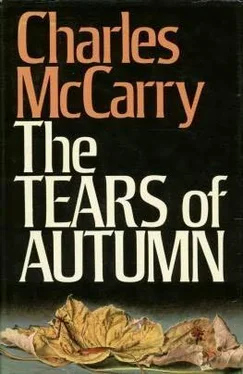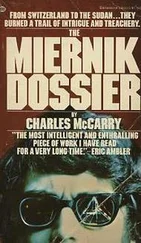“Our relationship is not political,” Molly said.
They had made love all afternoon. While Christopher took a shower, Molly wrote five hundred words on Italian fashions for the Australian weekly she represented in Rome. Christopher found her at the typewriter, naked, with her glasses slipping down her nose and a yellow pencil clenched in her teeth, when he came out of the bathroom.
“Tripe,” she mumbled. Molly wanted to live the life she thought he led, interviewing foreign ministers and film directors for a great American magazine. She kept all his articles, and would have typed them if he let her. Christopher did not want a secretary or a wife. He had hired Molly as an assistant two years before, to have someone in his office while he was away. It was important to his cover that someone answer the telephone and collect the mail. He kept nothing in the office, or anywhere else, that would connect him to his work as an agent. Molly could discover nothing.
Molly, who talked so beautifully, wrote badly, and she had never had an editor who knew enough about English to punish her for it. She asked too many questions when she interviewed; she had not learned to let her sources talk and betray themselves. Mostly she did stories about Italians, who liked the flat accent she used to speak their language, and tried to seduce her. She had beautiful legs and a soft way of smiling that made men want her.
Christopher had realized that he wanted her to stay with him after they had gone to bed for the first time. They had eaten lunch together on the first warm day of the year in the Piazza Navona. Molly had tied a scarf under her chin, and her bright hair was hidden. When Christopher spoke to her she searched his face, as though for some hint that he was mocking her. She spoke English with a public school accent, but when she talked Italian to the waiter her Australian intonations were audible.
She wore a gray sweater and a pleated skirt like a schoolgirl, and Christopher thought she was ashamed of her clothes, as she was ashamed of her Australian accent. He wanted to ask why she flinched when he talked to her; he thought she must be having a bad love affair. Her eyes were flecked with copper, and when she peeled a mandarine he saw that she had lovely, skillful hands.
Out of mischief, because she was so shy, he said, “Would you like to make love?” Molly replied, touching the corner of her mouth with a napkin, “Yes, I think I would.”
Webster knew that Christopher slept with Molly. He sent her name in for a background investigation without mentioning that she was Christopher’s mistress. “Do you want to read the file?” Webster asked when it came back from Canberra. “No,” Christopher said. “She seems to be okay,” Webster said. “If you have to live with a foreigner, an Australian is as clean as you can do.” They did not live together; Molly kept her own small apartment. She didn’t like the bed at his place, where Cathy had slept.
They walked to the restaurant through the Borghese Gardens. Molly did not hold his arm; she never touched him in public. Streetlights glowed in the branches of the trees. They paused on the Pincio and looked out over the dark city.
“We’re too late for the sunset,” Molly said.
After dinner, they drank coffee in the Piazza del Popolo. “Rome does smell of coffee in the winter,” Molly said. “Have you ever mentioned that to me?”
She grinned at him. Christopher loved the scent of Rome, a mixture of dust and cooking and bitter coffee. When he had drunk enough wine, he described the aroma of the city to Molly, and they tried to separate the odors.
Molly had caught him in the middle of a thought. He didn’t want to leave her, but she mistook what she saw in his face.
“You don’t much like being loved, do you?” Molly said.
Christopher stopped himself from touching her. “I’m going to the States next week,” he said.
“For how long?”
“A week, ten days.”
“Will you be coming back to Rome, or going on?”
“To Rome. Maybe we can go someplace together.” Molly read his face again. “We’re already here,” she said.
David Patchen came to the safe house in Q Street at three o’clock in the morning. He was white with fatigue, and the glass of scotch Christopher gave him trembled in his hand. He drank it and poured another before he spoke.
“Dennis Foley wants your balls for breakfast,” he said.
As a seventeen-year-old Marine on Okinawa, Patchen had been wounded by grenade fragments. The left side of his face was paralyzed. He walked with a limp. One of his eyes had been frozen open and he had learned not to blink the other; he wore a black eye patch when he slept. Patchen had no gestures. He was so still, like a hunting animal lying on the branch of a tree, that people would cough in nervous relief when finally he moved, and they saw that he limped.
Christopher was Patchen’s only friend. They met in a naval hospital in the last days of the war and played chess together. While Patchen was still in a wheelchair, they were mustered with a handful o other wounded men to be decorated by a visiting admiral. Afterward, as Christopher pushed Patchen along a path planted with oleanders, Patchen unpinned the Silver Star from his bathrobe and threw it into the bushes. Both men were younger sons who had grown up in families in which an older brother was the preferred child. They were contemptuous of human beings who needed admiration.
Later, they had been roommates at Harvard. Another Harvard man, a few years older, took them to dinner at Locke-Ober’s in the spring of their senior year. He ordered Pouilly-Fumé with the oysters and Médoc with the roast lamb, and afterward, in his room at the Parker House, recruited them for intelligence work. Neither man hesitated; they understood that what the recruiter was offering them was a lifetime of inviolable privacy.
Because people who had seen him remembered his wounds, Patchen remained in Washington. He was a natural administrator; he absorbed written material at a glance and never forgot anything. He knew the names and pseudonyms, the photographs and the operative weakness of every agent controlled by Americans everywhere in the world. Patchen never met any of them, and none of them knew he existed, but he designed their lives, forming them into a global sub-society that had become what it was, and remained so, at his pleasure. His hair turned gray when he was thirty, possibly from the pain of his wounds. At thirty-five he was outranked by only four men in the American intelligence community.
Christopher had gone into the field almost at once. It was thought that his book of poems gave him reality and an excuse to go anywhere. He began to write magazine articles after the brief notoriety of his poems dissipated.
They met once or twice a year in Washington. Patchen’s wife was gone, like Cathy Christopher. Patchen and Christopher saw changes in one another, but the changes were physical. Their minds were as they had always been. They believed in intellect as a force in the world and understood that it could be used only in secret. They knew, because they had spent their lives doing it, that it was possible to break open the human experience and find the dry truth hidden at its center. Their work had taught them that the truth, once discovered, was usually of little use: men denied what they had done, forgot what they had believed, and made the same mistakes over and over again. Patchen and Christopher were valuable because they had learned how to predict and use the mistakes of others.
“Foley ordered me to destroy any report you’d filed on that theory of Carson Wendell’s about the 1960 election,” Patchen said. “I told him there was no report.”
Читать дальше












